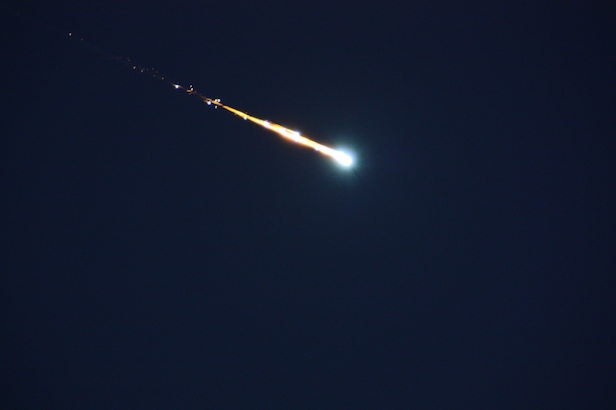Meteor spotted exploding over Michigan
A meteor crashed into Earth’s atmosphere above Michigan causing it to shine brighter than a full moon

Fireball meteors like this occur once or twice a month all over Earth. Image credit: R. Mikaelyan
A fireball was seen lighting up the night skies of southeastern Michigan, United States on the night of 16 January 2018. This American Meteor Society received over 355 fireball reports from seven different states, and the National Earthquake Information Centre even measured a magnitude-2.0 event on a seismometer corresponding to the fireball. NASA has confirmed that this was a meteor with a trajectory from Brighton to Howell, both of Michigan.
The dazzling meteor occurred at 8:10 p.m. Central Time (2:10 a.m. Greenwich Mean Time on the 17 January), and caught many people’s attention as it broke up in the atmosphere, 20 miles (32 kilometres) above the surface. NASA estimated that the meteor was originally two metres in diameter, and travelled at about 28,000 miles per hour (45,000 kilometres per hour).
“So this one was on the slow side, which is one reason why it made it so deep into the atmosphere,” says Bill Crooke, lead of NASA’s Meteoroid Environment Office in Huntsville, Alabama, United States. “The faster you move, the more energy you dump in the atmosphere, which heats you up more and the less you survive.”
As the piece of space rock came crashing into Earth’s atmosphere, the intense friction between the two caused an extremely bright flash of light, a sound resembling thunder and a 2.0 magnitude earthquake. The meteor was a super bolide, which means its brightness of it was between a full moon and the Sun. An event like this one normally happens once or twice a month throughout the whole planet. “Not so rare for Earth,” says Cooke. “Very rare for Michigan, because it’s only a small area.”
As for the thunderous sound and resulting earthquake, this is due to the meteor moving 40 times the speed of sound. We are familiar with jets that can move into supersonic speeds, and from this we are familiar with the ‘sound wake’ they create when breaking the speed of sound. This is same thing that happened to the meteor, and the loud boom sent intense shockwaves downwards, causing the ground to shake in southeastern Michigan.
The intense friction between the supersonic meteor and our relatively dense atmosphere began stripping the space rock, causing a shower of meteorites with each weighing perhaps 28 to 57 grams (1-2 ounces). It is believed that these meteorites could be currently spread over 4 kilometres (2.5 miles) at Livingston County’s Hamburg Township.
Keep up to date with the latest reviews in All About Space – available every month for just £4.99. Alternatively you can subscribe here for a fraction of the price!




